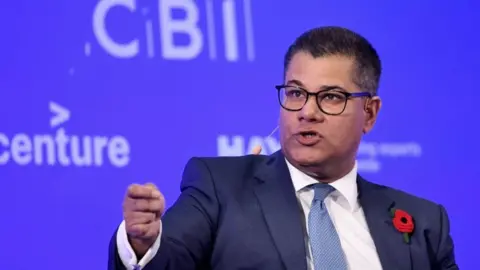Business Secretary Alok Sharma eyes more resilient economy

 PA Media
PA MediaBusiness Secretary Alok Sharma had the dubious pleasure of stepping into his boss's shoes to address a business community reeling from the announcement that England will follow Wales and Northern Ireland into a form of national lockdown on Thursday.
It is only the second time in the history of the CBI that the prime minister of the day has not given a keynote speech to the biggest annual gathering of business leaders.
Trying to sell an idea that the PM dismissed as absurd just last week to a crowd that have collectively spent billions trying to adapt to ever-changing government guidance is a tough gig. Alok Sharma will be grateful that the event, like everything these days, was virtual.
Nevertheless, he had plenty to say for himself. He delivered an unexpectedly long speech which pledged to involve business in rebuilding a more resilient, greener and high-skilled economy over the next 10 years.
In answer to outgoing CBI boss Dame Carolyn Fairbairn's comments that mass unemployment was the greatest threat facing the economy, he pointed to the success and extension of the furlough scheme, while talking up the importance of the Kickstarter job scheme for 16-24 year olds.
There was a strong focus on skills, green technology and the importance of regional hubs as a driver of growth.
He also promised progress on mass testing with results in minutes - something that Carolyn Fairbairn flagged in her introduction as critical to get right during the upcoming lockdown.
Labour leader Sir Keir Starmer, who took to the stage late morning, was robust in his criticism of the way the government has handled the pandemic.
He pointed out that when Sage recommended a short circuit-breaker lockdown back in late September, infections were running at 4,000 a day and deaths at 11, whereas now the numbers are 22,000 and 326. He placed the blame for that decision firmly on the Chancellor, Rishi Sunak.
The problem with virtual conferences is that it's hard to take "the mood of the room", but given this is the biggest crisis to hit the economy in peace time, Carolyn Fairbairn must be right when she described business as feeling "desperate and exhausted" - another reason, she said, why the government must secure a Brexit deal with the EU.
